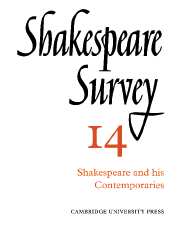Book contents
- Frontmatter
- Studies in Elizabethan and Jacobean Drama since 1900
- Shakespeare and Lyly
- Shakespeare and Mundy
- Marlowe as Provocative Agent in Shakespeare’s Early Plays
- The Tragedy of Revenge in Shakespeare and Webster
- The Simplicity of Thomas Heywood
- The Tragic Vision of Fulke Greville
- Shakespeare v. The Rest: The Old Controversy
- Shakespeare’s Gentleness
- Milton on Shakespeare
- An Unrecorded Elizabethan Performance of Titus Andronicus
- Stratford-upon-Avon a Hundred Years Ago
- International Notes
- Shakespeare Productions in the United Kingdom: 1959
- Three Directors: a Review of Recent Productions
- The Year's Contributions to Shakespearian Study 1 Critical Studies
- 2 Shakespeare’s Life, Times and Stage
- 3 Textual Studies
- Books Received
- Index
- Plate section
Milton on Shakespeare
Published online by Cambridge University Press: 28 March 2007
- Frontmatter
- Studies in Elizabethan and Jacobean Drama since 1900
- Shakespeare and Lyly
- Shakespeare and Mundy
- Marlowe as Provocative Agent in Shakespeare’s Early Plays
- The Tragedy of Revenge in Shakespeare and Webster
- The Simplicity of Thomas Heywood
- The Tragic Vision of Fulke Greville
- Shakespeare v. The Rest: The Old Controversy
- Shakespeare’s Gentleness
- Milton on Shakespeare
- An Unrecorded Elizabethan Performance of Titus Andronicus
- Stratford-upon-Avon a Hundred Years Ago
- International Notes
- Shakespeare Productions in the United Kingdom: 1959
- Three Directors: a Review of Recent Productions
- The Year's Contributions to Shakespearian Study 1 Critical Studies
- 2 Shakespeare’s Life, Times and Stage
- 3 Textual Studies
- Books Received
- Index
- Plate section
Summary
Commenting on a possible Shakespearian allusion in Milton’s ‘Elegia Prima’ Thomas Warton said that ‘seduced by the gentle eloquence of fanaticism, he listened no longer to the “wild and native wood notes of fancy’s sweetest child”’. The remark seems too categorical and the evidence that is produced in its support may not appear altogether unquestionable:
In his iconoclastes he censures King Charles for studying, ‘One, whom we well know was the closest-companion of his solitudes, william shakespeare’. . . . This remonstrance, which not only resulted from his abhorrence of a king, but from his disapprobation of plays, would have come with propriety from Prynne or Hugh Peters.
This observation angered several Miltonists of the nineteenth century: Charles Symmons called it 'perverse imbecility' and J. A. St John called it 'paltry malignity'. The question may be asked if Milton adored Shakespeare as a great poet and if Renaissance poetry as a whole answered to his idea of great poetry. Without comparing Milton with the author of Histrio-mastix (1633) it is legitimate to inquire if Milton's judgement on Renaissance literature, so far as it can be ascertained from his writings, was not derived from a conception of poetry not typical of contemporary literary taste. To consider the allusion to Shakespeare in the first chapter of Eikonoklastes as a two-fold denigration of a bad prince and of a bad poet may be an unjust inference. But that Shakespeare could be a comforting poet to a deposed monarch might have been consistent with Milton's own estimate of the dramatist. It is significant that the reference to Shakespeare in Eikonoklastes is immediately followed by a comment on ' the vain amatorious Poem of Sr Philip Sidneys Arcadia; a Book in that kind full of worth and witt, but among religious thoughts, and duties not worthy to be nam'd'.
- Type
- Chapter
- Information
- Shakespeare Survey , pp. 98 - 101Publisher: Cambridge University PressPrint publication year: 1961



